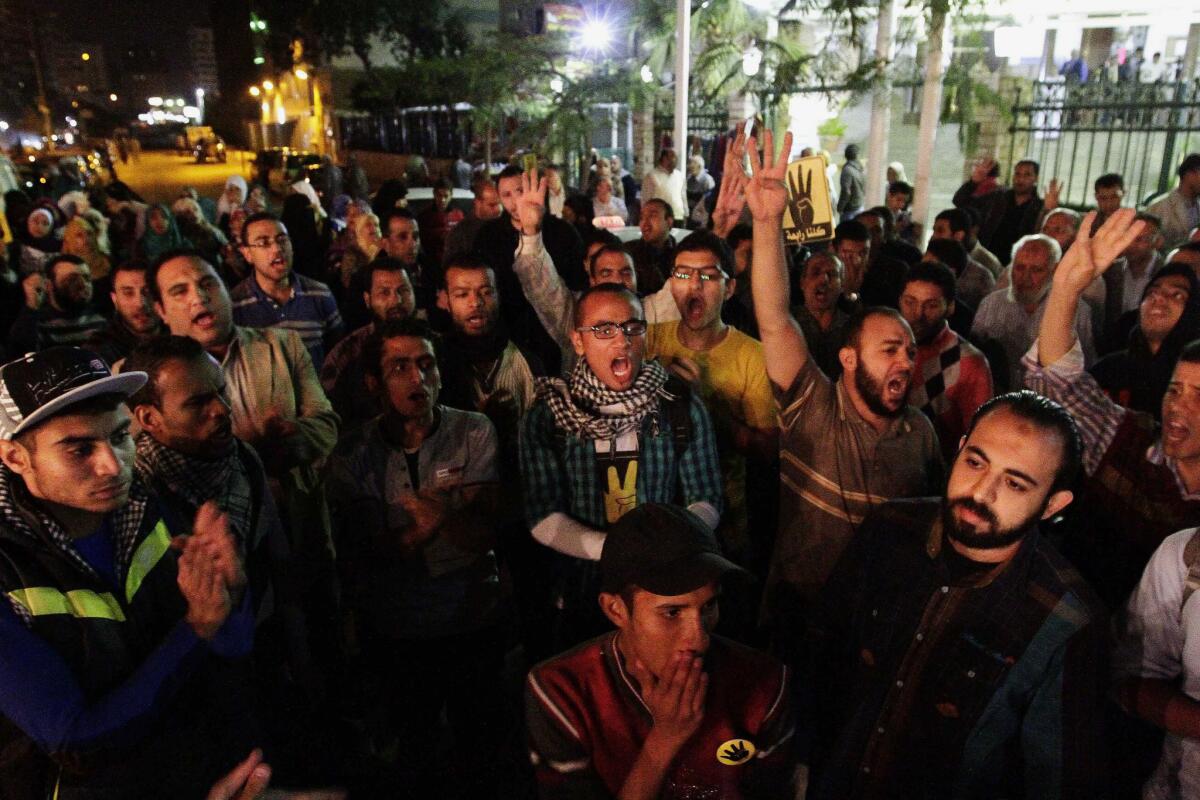Egypt takes aim at protests, bans unapproved gatherings

- Share via
CAIRO — Egypt’s interim president on Sunday banned public gatherings of more than 10 people without prior government approval, imposing hefty fines and prison terms for violators in a bid to stifle the near-constant protests roiling the country.
The new law is more restrictive than regulations used under the rule of autocrat Hosni Mubarak, overthrown in Egypt’s 2011 uprising that marked the start of unrest in the country. Rights groups and activists immediately denounced it, saying it aims to stifle opposition, allow repressive police practices and keep security officials largely unaccountable for possible abuses.
“The law is giving a cover to justify repression by all means,” said Bahy Eddin Hassan, head of the Cairo Institute for Human Rights Studies, one of the local groups that had campaigned against the law.
The military-backed government first floated the law in October. Interim President Adly Mansour approved a slightly amended version Sunday, which removed a proposed ban on sit-ins and a draft portion criminalizing “insulting the state.”
The law requires three-day prior notice for protests. It grants security agencies the right to bar any protests or public gatherings, including election-related meetings of political parties, if they deem it a threat to public safety or order. Protesters can appeal the decision, but the law doesn’t force judges to rule ahead of scheduled protests.
The new law also bars gatherings in places of worship, a regular meeting place for all protests in Egypt and one heavily used by Islamist groups. The law also says the police have the right — following warnings — to use force gradually, including the use of water cannons, tear gas and clubs.
Rights groups say the law also gives police unrestricted use of birdshot to put down protests.
Penalties in the law range from seven years in prison for using violence in a protest. It calls for one year in prison for covering the face, in a country where many women wear full-face veils. It calls for a similar prison sentence for protesting in or around a place of worship.
The law comes 10 days after authorities lifted a three-month-long emergency order that granted security forces sweeping powers. Rights groups and political forces campaigned heavily against the law.
“The law is labeled one that regulates protest rights, but in essence it regulates the repression of the right to protest,” Hassan said.
Hassan said government officials and supportive media outlets promoted the law as a means to halt protests by supporters of ousted Islamist President Mohamed Morsi, who was removed by the military in July. Morsi’s supporters hold near-daily protests that often turn violent, though the size of the demonstrations have dropped due to an intense security crackdown targeting Morsi’s Muslim Brotherhood.
Shaima Awad, a member of the Muslim Brotherhood’s political party, said protests would continue, calling the new law “nonsense.”
“How can I notify them three days before the protests and give the names of organizers? It would be like handing myself in,” Awad said.
ALSO:
Iran’s leaders call nuclear deal a success
Afghan council defies Karzai on U.S. security deal
Honduras: Voters face historic choice against troubled backdrop
More to Read
Sign up for Essential California
The most important California stories and recommendations in your inbox every morning.
You may occasionally receive promotional content from the Los Angeles Times.










